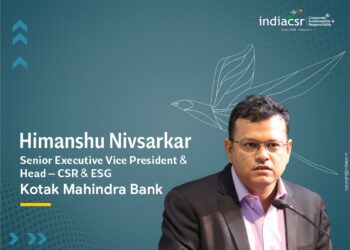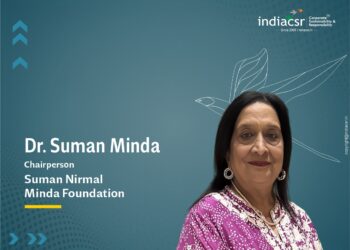Interview with Dr. Parvaiz Talib for India CSR Leadership Series with Nayan Mitra
NEW DELHI (India CSR): Another new month … and the India CSR Leadership Series is back with a brand new interview. After the three stalwarts in the extractive industry last month, who spoke on the lines of practitioner challenges and opportunities, this edition brings in the views of Dr. Parvaiz Talib, Chairman and Dean of the Business Administration department of Aligarh Muslim University. It is said that academicians and practitioners must co-exist, hence, it is critical to bring in both their views. We are very happy to bring to you this edition. Do enjoy!
‘CSR in India research is still in the nascent stage.‘ What is your opinion regarding the same?
According to my opinion it is difficult to investigate the exact state of Indian CSR research.
CSR is growing as a relevant management issue in India. Mainstream management and social science journals have dedicated special issues to the field. Conferences and networks of CSR researchers as well as dedicated research centres have also mushroomed. In business education, there has been a burgeoning of CSR texts, monographs and edited collections. There has been a growth of CSR courses in management education. There is also convergence towards a core CSR orientation by researchers in business ethics and business and society.
Overall, CSR knowledge is in ‘a continual state of emergence’, constituting a field with relatively permeable boundaries and with ‘no core theoretical approach, assumptions and method ‘a field without a paradigm’. As a result, there are still challenges to CSR concept and theory building.
What role can Strategic leadership take in incorporating CSR within their Organisations?
Corporate social responsibility (CSR) is a growing area of interest for academics and practitioners and in terms of both theory and practice.
Strategic leaders assist in formulating and implementing organisational CSR initiatives as the top managers are obviously in the best position to influence various types of strategies and projects with regards to CSR.
The most appropriate leadership style for organisations implementing CSR strategies is that which is strategically driven and which blend an individual’s integrity and personal values. Researchers have proposed that the new key responsibility of leadership is sense making of the external environment as leaders must help the organisation stay aware of and adapt to the rapid changes in its industry and new stakeholder demands. Strategic leaders may be needed when implementing CSR initiatives at least in some phases of implementation, for the key reason of their success in encouraging innovation through the questioning of ideas.
Role of Strategic Leadership in incorporating CSR practices:
The strength of commitment and leadership qualities of the CEO:
If CSR initiatives are to succeed, the CEO must believe it is the right thing to do and that business should do the right thing. He/She needs to have the foresight and courage to see that doing the right thing is good for business. His/Her moral conviction must be strong enough to convince others to follow. (Most employees will want to follow a sustainable path if that is where they are led. Being part of a team which is taking a sustainable path will be a source of great satisfaction to many.). The CEO has an important role to play in ensuring that the governance structures and management processes are in place and the leadership styles of the executive team are conducive to integrating sustainability.
A senior leader with the expertise, leadership skills and authority to make it happen:
A committed, proactive executive will be needed to make change happen. They will need to be knowledgeable about sustainability issues, processes, performance management and communication. If organisations are to change in time to avoid negative (social, environmental and business) consequences, this person needs to be senior enough to have authority. They need to have the trust and approach to the CEO. Moral authority and leadership skills are important, but not enough for the scale of change required.
Do you think that a course in CSR and Sustainability should be consciously integrated within the curriculum (especially that of Business Management), in India?
Business schools worldwide play an important role in preparing the most ethical and competent future business leaders who understands business sustainability. Yes, CSR courses must be effectively integrated in the syllabus of business management in India as most CSR curricula requires not just relevant content, but appropriate learning process that contribute to the critical analysis and evaluation of business and its relation to society. The process of teaching and learning in this subject shall ensure content dissemination, and encourage independent research, personal reflection, and extensive exploration and discussion both within and outside the classroom. With an emphasis on critique and evaluation, the content of the CSR subject should be designed for students to analyse CSR from a business perspective, specifically in terms of the marketplace, the workplace, in the community and the impact on the natural environment. Recent research into sustainability education in the top 50 global MBA programs shows that over seventy percent of them offer one or more units on sustainability related topics. This is an important step because these issues will likely define business strategy and performance globally in the next decade. In our management school in AMU, we have introduced a course titled ‘Sustainability in Business’.
Does AMU have any social responsibility wing that is run by the students? If yes, please tell us more about it.
AMU indeed offers a huge platform for various Social Responsibility initiatives. It has a community comprising 30,000 students and more than 2,000 teachers. Being primarily a residential university the students have sufficient time to pursue interest other than academics.
I distinctly remember an Eco-Club which was started by the students on their own initiatives which was later on adopted by the Cultural Education Centre of the University and is now an integral part of it. Sometime back we conducted an NGO’s meet in Residential Coaching Academy and were pleased to note that there are as many as 15 NGOs working for various causes related to livelihood, education and health, who participated. Our own MBA students last year did an extensive survey of applique workers which is a traditional craft of Aligarh. They arranged training for 20 such workers to enable them to upgrade their skills.
After this training, they have been able to identify 5 workers who are capable of premier production. They are now in the process of setting up a self help group for such workers so that the role of the middlemen is minimised and the members of the self help group can get most remunerated prices for their produce. However, I do feel a greater need for institutional ownership of such initiatives. This shall create more synergy in efforts.
What are the different challenges that you faced at various times in your association with a number of welfare organisations?
The real challenge is of identifying persons who can own up such initiatives in the real sense. The people who are blessed with genuine quality of head and heart. A person with such orientation is able to develop a team which is able to take the initiatives forward. Unfortunately, many a times such initiatives remain a one man show and that man is often more interested in preserving his own turf rather than genuinely seeking partners in cause which is the only way to ensure sustainability of such initiatives.
How do you think one can attract future leaders into the social development sector to make the world a better place to live and leave behind?
A major concern in running a business is in how to attract and retain talents. This is probably true for many companies in today’s economy. The costs on CSR efforts should be seen as spending to attract and retain talents. Being regularly profiled in the news for CSR work really helps in gaining reputation which in turn helps attract talents.
By giving a platform to ‘social entrepreneurs’ and creating an environment that incubates and promotes their initiatives, companies are finding that not only are they able to keep/ retain their most talented and highly skilled people, they are also fulfilling society’s growing expectations of the company’s role and opening the way for new ideas, broader markets and innovative ways of doing things.
The model is to evolve in an Organic way. Initially companies can locate such talents within (Let’s call them Social intrapreneurs) who demonstrate a flair for taking up such initiatives. These employees can be offered necessary handholding to crystallise their ideas on the ground. Once they have crystallised their model, they can be encouraged to set up their independent enterprises and can become ‘Social entrepreneurs’ in the real sense. They can continue to maintain their organic link with their parent organisation yet can work independently in a Sustainable fashion on their Social enterprise.
I recall the example of a leading consumer activist of the country Late Manu Bhai Shah. He branched out gradually and later become a leading consumer activist of the country and established a pioneering organisation ‘ Consumer Education and Research Centre’ in Ahmedabad.
Future leaders can be attracted to social development sector by organisational initiatives such as:
Authenticity in purpose and communication
Authenticity in CSR is about being an organization that not only stands for something, but also acts accordingly. It’s about saying what you mean, and meaning what you say — both internally and externally. CSR means more than good PR for your company and transparent communication practices should exist both internally and externally.
Business objectives
CSR is not a one-size-fits-all approach. While it’s about being true to your brand, your stakeholders and your culture, your CSR program ultimately needs to make sense for your business. The saying “what gets measured gets done” is true for CSR, and leaders in the industry know that for CSR to be truly embedded within the organization there has to be business value and need. Ultimately, CSR must be tied to business objectives. Performance metrics measuring CSR should be created and communicated internally and externally, senior leadership should support and champion the CSR initiatives.
What would be your advice to the Indian Corporations in implementing CSR in a country with as diverse need as India?
There is no “one-size-fits-all” method for pursuing a Corporate Social Responsibility (CSR) approach. Each firm has unique characteristics and circumstances, that will affect how it views its operational context and defining social responsibilities. Each will vary in its awareness of CSR issues and how much work it has already done towards implementing a CSR approach. That said, there is considerable value in proceeding with CSR implementation in a systematic way — in harmony with the firm’s mission, and sensitive to its business culture, environment, risk profile, and operating conditions. Many firms are already engaged in customer, employee, community and environmental activities that can be excellent starting points for firm-wide CSR approaches. CSR can be phased in by focusing carefully on priorities in accordance with resource or time constraints. Alternatively, more comprehensive and systematic approaches can be pursued when resources and overall priorities permit or require. The bottom line is that CSR needs to be integrated into the firm’s core decision making, strategy, management processes and activities, be it incrementally or comprehensively.
Some other relevant advice for the Indian businesses implementing CSR are:
Identify Focus
The first step organizations undertake when implementing CSR is to identify the focus of the program. An organization with too many causes will have a difficult time managing them appropriately. Narrowing the focus to one or two major causes enables the organization to become identified with that one specific cause and the participants in the program receive more focused attention.
Determine Costs
Corporate social responsibility involves financial considerations on a number of levels. For example, an organization should determine whether it will provide materials for a program, allow employee volunteerism or donate money to a cause.
Engage Employees
Organizations that are successful in implementing CSR involve their employees. They encourage employees to use their skills to help the cause. For example, marketing staff might be encouraged to help a non-profit with promotional efforts.
Communicate with Stakeholders
An organization implements CSR to benefit the program’s recipients, its employees and the organization as a whole. Information about the corporate effort must be shared with stakeholders such as customers, business partners and the community. Organizations that promote their social efforts through news releases, social media sites, networking events and public relations opportunities can be positively viewed by the community — but only if they do not do it in an obviously self-serving way.
Keep It Holistic
Link the past with the future, and make it count. To make business sense of sustainability, it first has to make sense for the business. Sustainability leaders develop a strategy that works for the business and its stakeholders, building on established strengths and unique selling propositions (USPs).
An important way of doing this is by linking relevant experiences from the past to the business’s current situation. This serves as a transitional bridge, so employees can relate to how the company has successfully implemented change previously.
Prepare to Adapt
Stay flexible and adaptable. There’s no doubt that meaningful change takes time, and the journey of sustainability is an ongoing process. Along the way, there will always be unforeseen challenges and mistakes that need to be corrected. Again, the solution lies in the company culture.
When the corporate culture is healthy, challenges will be addressed with flexibility and creativity, while transparency will create understanding. It is a well-worn expression, but it is especially true when it comes to sustainability: where there is a will, there is a way. And while the way might be long, the journey is worth the effort.
About Dr. Parvaiz Talib
Parvaiz Talib holds MBA and Ph.D in the area of Stress Management. He has teaching experience of more than 25 years. His areas of research are Stress Management, Strategy, CSR and Human Resource Management. He has published papers in national and international journals like Vikalpa, Indian Police Journal and International Journal of Logistics Systems and Management. His articles have appeared in Times of India. His special interest lies in Counselling and Guidance of students. He trains students, young teachers and corporate professionals in Communication Skills and Personality Development. Presently, he is handling a prestigious project of New Management Complex (NMC) in AMU, built through Donors’ support.
About Nayan Mitra
Nayan Mitra comes with a rich mix of diverse professional experience of over sixteen years. She straddles seamlessly between academics, social and corporate sectors. As a Developmental Consultant and Researcher, she works closely with some of the eminent Corporations and not-for profits of India as well as being in their Advisory and Board level. She has conducted several social researches for multi-lateral agencies; the findings of which have become important bases for sustainable action. She has been a resource person in eminent Institutions of higher learning in the areas of CSR and Corporate Governance and has important peer reviewed research publications to her credit in double blind peer reviewed national and international Academic journals and books as well as delivered at key Conferences. Her book, ‘Corporate Social Responsibility in India: Cases and Development after the Legal Mandate’ alongwith co-editor Dr. Rene Schmidpeter is a first book of its kind that charters the development of mandated Indian CSR from a multi-stakeholder perspective, that has recently received the coveted India CSR Author Award, 2017. She spearheads the India CSR Leadership Series by India CSR. She was a finalist of the prestigious Chevening Gurukul Scholarship for Leadership and Excellence – 2013, as conferred by the Foreign and Commonwealth Office (FCO) of the British Deputy High Commission.
You may also like:
- We strive to make a positive impact on the society and environment: Kazutada Kobayashi, President & CEO, Canon India
- Our Core Values Drive Sustainability Across Our Business and Serve: Manoj Kumar Singh, Chief of Regulatory Affairs, Sustainability & CSR, Industowers
- Samsung Smart Class Aims to Bridge the Digital Gap Between Rural and Urban, Says Deepak Bhardwaj, Vice President, Samsung India
- CSR Interview with Dr. CS Kedar, Ratan Somani, Vikas Sharma
- Change Comes With Collaboration at Vedanta Nand Ghar: Ritu Jhingon, Project Head























